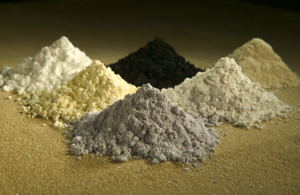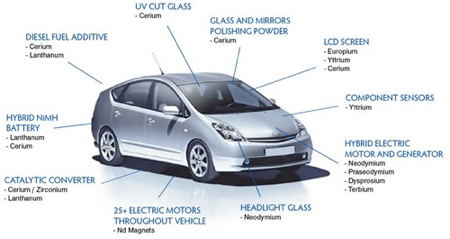Rare-earth crisis sparks quest for alternative motors
Japanese motor manufacturers are scrambling for motor technologies that do not need rare earth metals, following a crisis in which China, which produces 95–97% of the world’s rare earths, cut off supplies to Japan and limited supplies to other countries. The materials (shown below) – which include neodymium, dysprosium and yttrium – are needed for a wide range of applications, from electric vehicles and wind turbines, to computer hard drives and mobile phones.

In recent years, China has come to dominate the global market for rare earths by undercutting producers in other countries, thus forcing them out of the market. In recent months, however, it has raised the prices of some of its rare earth materials nine-fold.
China has also cut back on its production of rare earths, citing environmental and energy-saving reasons. At the same time, it is using more of them in domestic manufacturing, and placed a limit on exports.
The rare earth problems hit the world’s headlines in September when China blocked supplies to Japan following a collision between ships from the two nations in disputed territorial waters. Japan relies on China for more than 90% of the 30,000 tonnes of rare earths it imports every year. Its demand has been growing as it ramps up production of electric and hybrid vehicles, each of which typically needs 9–15kg of rare earths for motors, batteries and other equipment. The diagram below (from the US rare-earth producer Molycorp) shows some of the areas where rare earths are used in hybrid vehicles. A conventional car contains about 5kg of the materials.

The crisis has accelerated Japan’s quest to reduce its dependence on rare earth materials. Its New Energy and Industrial technology Development Organisation (Nedo) announced recently that, working with researchers from Hokkaido University, it has developed “the world’s first” rare-earth-free, high performance motor for hybrid vehicles. The 50kW motor is similar in performance to the motors currently used in Toyota’s Prius hybrid-electric car, which need 1kg of rare-earth materials.
The Japanese motor-maker Nidec has revealed that it is planning to start producing switched-reluctance motors which do not need rare earths. Nidec acquired the switched-reluctance technology when its bought Emerson Electric’s Motors and Appliance Controls businesses earlier this year. These businesses included the UK-based switched-reluctance specialist, SR Drives.
Nidec plans to start producing switched-reluctance motors for heavy machinery from 2012, followed by versions for tractors and other vehicles. At present, Nidec’s produces synchronous motors that use permanent magnets inside the rotor core for the electric vehicle market.
Other motor developers with technologies that do not rely on rare-earth materials, are taking the opportunity to promote them. For example, Gibraltar-based Chorus Motors says that its multiphase Meshcon motor can produce five times the start-up torque of a similar-sized conventional three-phase motor, and more than a comparable permanent magnet motor, without using any rare earths or other exotic materials.
The rare-earth supply problems could last for a few years until new sources come on stream in countries including Vietnam, Australia, Kazakhstan, Turkey and India. In the US, rare earth production sites that were shut down because they could not compete with China, are being re-opened.





